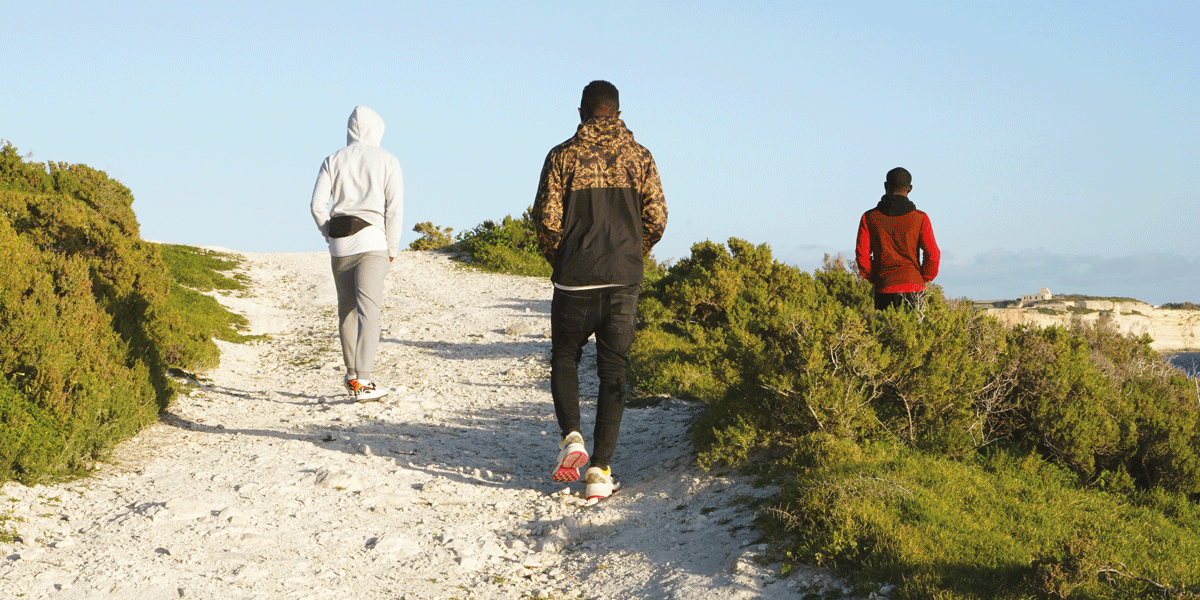


The El Hiblu 3 case: In the Dock of Fortress Europe
Jelka Kretzschmar
Free the El Hiblu 3 Campaign
The El Hiblu 3 live in Malta. Every day they have to sign in with the police. Every month they go to hearings in the Maltese court, hoping to leave as free men. They have jobs, they have flatmates, one has children, but they are not free.
Their names are Abdalla, Amara and Kader and together we call them the ‘El Hiblu 3’. The El Hiblu 3 are three young men stuck in the limbo of ‘lawfare’ against migrants. Their lives are put on hold as they await trial in Malta.
The three arrived in Europe in March 2019 aboard the merchant vessel the El Hiblu 1. The tanker had rescued them from a sinking rubber boat two days prior, following instructions of a European patrol aircraft. During the rescue operation, six people decided to stay on the deflating rubber boat instead of boarding the large ship. After being sighted one last time by a European patrol aircraft, those six people disappeared and are presumed dead.
Despite telling the shipwrecked that they would be brought to Europe, the tanker steered south towards Libyan shores. At dawn, when the survivors realised where they were heading, they protested. Some even threatened to jump overboard out of desperation. The conditions in Libyan camps are well known: confinement, blackmail, rape, torture, slavery and arbitrary killings define daily realities.
The international law of the sea says: “People rescued from distress at sea have to be taken to a place of safety”. Under no circumstances can Libya be considered a safe port for people on the move. Even the United Nations and the European Commission agree on that. In January 2017, an internal report of the German embassy in Niger described ‘concentration-camp-like’ conditions in Libya’s detention prisons.
So the people on board the El Hiblu 1 protested. Many of them spoke Bambara, Malinke, Fula, West African languages. Some spoke French. Only one or two young people spoke enough English to converse with the captain. One tried to translate, others to mediate between a scared crew and scared passengers.
Eventually, the ship steered towards Malta, where it was stormed by the military and three young men, then 15, 16 and 19 years old, were arrested immediately. These young people, two still children, were thrown in jail and accused of terrorism, of hijacking the ship, of wilful destruction of property. They were the same three young men who acted as translators and mediators, who tried to calm people on board and converse with the crew in order not to be forced back into the hell of Libyan detention camps: Abdalla, Amara and Kader.
The legal principle of self-defence describes the right to prevent suffering, violence and imminent danger to one’s life or the life of a fellow human being, using force if necessary. If they are to be judged, the actions of the El Hiblu 3 must be seen as an act of self-defence – in conversing with the crew they resisted having their human rights trampled on and righteously protested against an illegal pushback. No person on the ship was harmed and, thanks to their actions, they and their 105 fellow travellers reached a place of safety in Malta. Even with their own lives at stake, they sought to protect their own human rights and freedom, as well those of the people they travelled with. This must be seen as a tremendously courageous act. But instead of being celebrated, the El Hiblu 3 are prosecuted.
Immediately thrown into a high security wing in Malta’s prison, they were only moved to regular facilities for juvenile offenders and adults two weeks later. Months passed. Almost eight months after their arrival, the three young men were finally released on bail in November 2019. Today, Abdalla, Amara and Kader have been released for over two and a half years, awaiting a trial that could lead to their imprisonment for life. They are allowed to work and pay taxes, but they are not allowed to go for a swim on Malta’s beaches as their bail conditions dictate that they must stay 50 metres away from the coastline. If they miss signing in with the police one day, they risk going back to jail. In 2020, most of their hearings were postponed, after they were left to wait for hours in the Courts of Justice in Valletta. The prosecution only began to invite El Hiblu 1 survivors as witnesses in March 2021, two years after they had arrived in Malta and too late for many to be located.
In early 2020, we started to campaign collectively with survivors from the El Hiblu 1 rescue as the farcical proceedings against the El Hiblu 3 dragged on. On the first anniversary of their arrival in Malta, we released a documentary, where several survivors of the journey expressed their frustration about the proceedings against their three friends. In 2021, among many others Der Spiegel, the BBC and the Times of Malta reported on the case and its absurdity. Founding the El Hiblu 3 Freedom Commission, we took another step towards a transnational mobilisation to keep our promise to Abdalla, Amara and Kader: to leave nothing undone until we achieve justice and their freedom.
Resisting human rights abuses is not only ethically and morally justified but also protected by law. This resistance deserves not only our attention but our celebration. We bear collective responsibility to oppose the dismantling of all human rights achievements: to guarantee that human rights are the same for everyone, to guarantee that people do not drown or disappear in their attempt to reach Europe. Regardless of origin, economic status, personal belief or skin colour. Human rights belong to everyone. That is not negotiable. Free the El Hiblu 3.